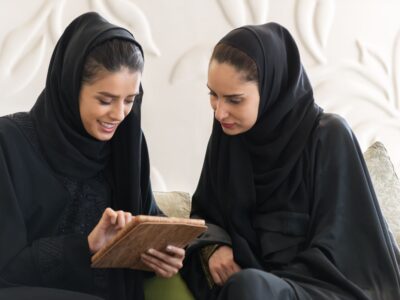The United Nations Industrial Organization estimates countries are losing $172 trillion in wealth because of differences in women’s and men’s lifetime earnings. Global human capital wealth would increase fivefold if women earned as much as men, according to a report by the World Bank.
The contribution of women in business to facilitating wider, positive social and cultural change is also profound. According to a combined study by Arab Petroleum Investments Corporation, The American University in Cairo and Arabian Business, investing in ESG is twice as likely to be considered by female investors and policymakers than by male investors. Women disrupt ossified systems, evolve established norms, and spark collaborative movements.
In the face of this overwhelming evidence, women continue to be underrepresented and undervalued in business. In the Middle East, women represent around 49% of the region’s total population but their participation in the labour force and corporate leadership positions is significantly lower. A closer look at the data also reveals the gap in the number of women owning and managing microenterprises, small and medium-sized enterprises (SMEs) and leading large corporations.
Government-led initiatives, such as the introduction of paid parental leave in the UAE, offer tangible solutions that will help to address this imbalance going forward. The Emirates Securities and Commodities Authority (ESCA) has also introduced a requirement for all UAE companies to have at least one woman on their boards by 2025.
Research released earlier this year by Aurora50 and Mohammed Bin Rashid School of Government (MBRSG) suggests 8.9% of companies have met the standard thus far. The percentage is a significant improvement on the 2020 figure (just 3.5% of companies), but progress must accelerate in the coming years if business is to meet ESCA’s target.
Realising this potential will require a collective effort – from government, the private sector and educational institutions.
At London Business School, we are prioritising gender parity across our programmes and looking beyond the typical business school recruitment pipelines, such as consulting and finance, to boost women’s representation in leadership positions.

This year, 32% of candidates in our Dubai-based Executive MBA programme are women. We recognise the critical role business education plays in launching talented women towards C-Suite positions and are committed to seeing the percentage of women on the programme grow even further.
Central to these efforts is our Forever Forward campaign, which aims to boost women’s representation in business through a greater emphasis on research, innovation, and the learning environment, and a doubling of our scholarship offering.
It was a privilege to launch the campaign and meet with members of our 50,000 person-strong alumni network during my recent visit to Dubai; our MENA-based graduates are at the forefront of supporting women’s leadership development in the region.
Muna Al Gurg, Vice Chairperson and Retail Director of Easa Saleh Al Gurg Group and an LBS alumna, is a prime example of this. As a leader within our community, she is showing the way. With the Muna Al Gurg Scholarship programme at LBS, she is directly contributing to the presence of women at the senior level of companies, creating a pipeline of future female CEOs in the region. That impact is already being felt. Recipients hold senior roles in businesses across the MENA region and in sectors as diverse as finance, energy and government.

Women’s Entrepreneurship Day earlier in November saw communities empower, celebrate, and support women in business across the globe. It was also a timely reminder that, with so much talent and knowledge waiting to be unleashed, we all stand to benefit from championing women’s greater representation at the upper echelons of business.
Improving access to world-class business education is a formidable lever through which that potential will be realised. It is through business education that the knowledge, critical thinking skills and networks are developed that will ensure measures such as ESCA’s minimum board quota are not only met but exceeded. More broadly, it is an accelerator that will deliver not just economic prosperity, but a better, more sustainable world for all.









